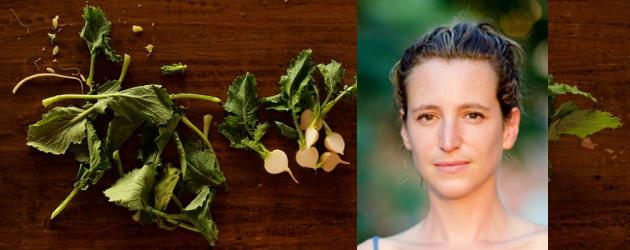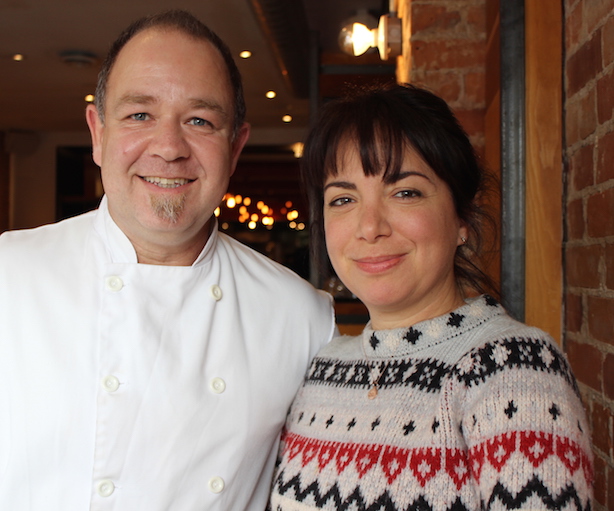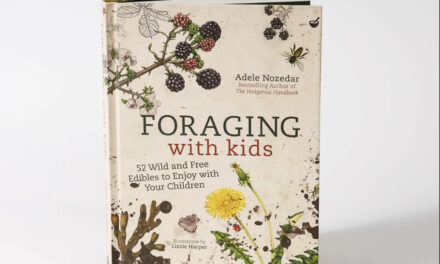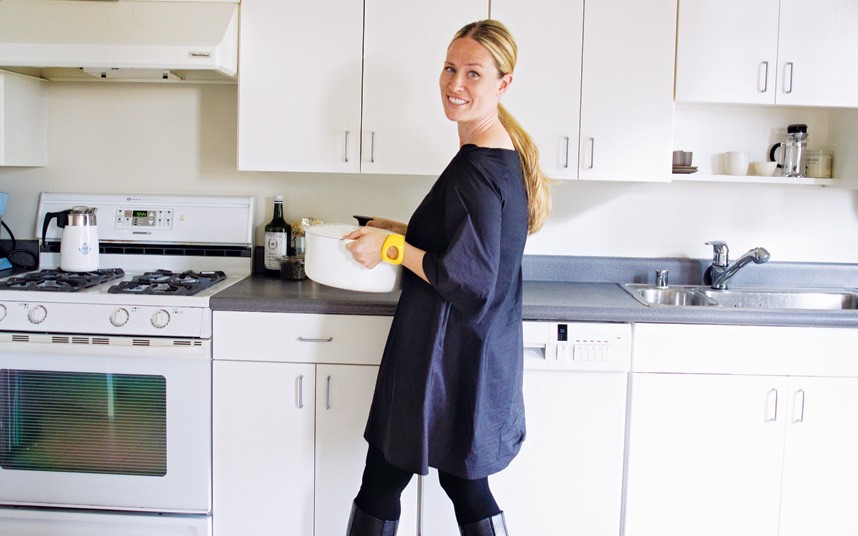by Malcolm Jolley
When I grow up I want to be Tamar Adler.
Adler is the author of An Everlasting Meal: Cooking with Economy and Grace. It was published last September and will reappear in June as a paperback. Everlasting Meal is something of a throwback to the golden era of cookery writing: think Elizabeth David, Jane Grigson and M.F.K. Fisher. In fact, Adler modeled Everlasting Meal on Mary Francis Kennedy Fisher’s classic book ‘How To Cook a Wolf’ (1942), drawing a parallel between the scarcity of wartime and the hard times brought on by the recent financial crisis. And it works. It works perfectly: Adler establishes tone, reasons and presents a strong and no-nonsense, yet obviously feminine, argument for eating well without breaking the bank or compromising on quality. She privileges vegetables over meat and simple, well cooked food over flights of fancy. It’s a beautiful book that is as likely to be read in 20 or 50 years as now – maybe more. It’s got soul.
 Did I mention I like the book? I certainly did to Tamar Adler this week when I had her on the phone from Brooklyn, New York. And then, again, when we abandoned crummy cell phone service for the fuzzy grain of Skype. There was not point in pretending my approach to the interview was going to be anything remotely Mike Wallacy, or even close to objective, so I quickly confessed my admiration of anyone who would dare to write, let alone manage to get published, a lyrical book on cooking wherein recipes were subordinate to the discussion of kitchen truths and, save for an alluring cover of turnips, there was no food styling, let alone a picture of any kind – just words and a very clear idea about how food ought to be cooked and enjoyed. Our dialogue, then, was shaped around my attempt to answer the question of what recipe of human experience had created the author of An Everlasting Meal? Here’s what I learned…
Did I mention I like the book? I certainly did to Tamar Adler this week when I had her on the phone from Brooklyn, New York. And then, again, when we abandoned crummy cell phone service for the fuzzy grain of Skype. There was not point in pretending my approach to the interview was going to be anything remotely Mike Wallacy, or even close to objective, so I quickly confessed my admiration of anyone who would dare to write, let alone manage to get published, a lyrical book on cooking wherein recipes were subordinate to the discussion of kitchen truths and, save for an alluring cover of turnips, there was no food styling, let alone a picture of any kind – just words and a very clear idea about how food ought to be cooked and enjoyed. Our dialogue, then, was shaped around my attempt to answer the question of what recipe of human experience had created the author of An Everlasting Meal? Here’s what I learned…
“My mother cooked and served food with care and pleasure,” says Adler, explaining her home gave her the foundation for her culinary worldview. “Her food was joyous, but not overwrought”, she adds. But cooking was not to be first “calling”, a word Adler uses frequently, a product of her Quaker-influenced education at Haverford College. Instead it was writing and after graduation in the early 2000’s she found herself with a plum job at Harper’s magazine in New York City, compiling weird and wonderful stories for the front section. But even though Adler is adamant that she loved her job at Harper’s, something wasn’t altogether right, and she wondered if writing and the magazine world were really her calling after all. (Later in the conversation, she jokes “Every time I have a bad day at work I wonder if I’m really following my calling.”)
Not far from the Harper’s offices was a small, simply decorated restaurant owned and operated by literate chef: Gabrielle Hamilton’s Prune. Visits to Prune inspired Adler and somehow she persuaded Hamilton to let her lead a secret life of restaurant cooking every Saturday. “I felt like there was a person inside of me that had to get out, and that person was a chef.” Still, after about a dozen Saturday shifts, Hamilton offered Adler a promotion and it was time to decide which career to pursue. When Adler wavered back to a life of letters, she says Hamilton exclaimed “Hallelujah!” and expressed relief that Adler had chosen a genteel profession instead of a life of toiling over the heat of the stoves.
Adler would not be far from the cooking and food world for long. Her brother was a young cook working for another chef with some interesting ideas about local food and public consciousness about the industrial food system and wanted some help with researching and editing. His name was Dan Barber and he had an idea for a restaurant that was also a farm and education centre he was calling the Stone Barns. “This was pre-Omnivore,” Adler says referencing Michale Pollan’s The Omnivore’s Dilemma (2006), which is widely credited as a turning point in the wider acceptance of the local food movement, “I did research on sustainable agriculture, looking for leaders in the field so [Barber] could create an advisory board and put together a body of solid work for him to draw on to make the case that Stone Barns was important.”
As Adler immersed herself in the growing locavore and sustainable food movement, she received an invitation from some friends at the University of Georgia in Athens to come down and help them open a restaurant connected to an experimental farm they were running on university land. It turned out Adler was the only one in the group with any actual restuarant experience, as slight as it may have been, and what was supposed to be a week’s visit turned into two weeks and then nearly two years. She had adjusted her calling once again and found herself in the kitchen every day and night, working 80 hours a week as the chef at Farm 255. Adler credits this as her true kitchen training, saying “It was a shock, but it worked.”
After nearly two years, Adler needed a break and she found one with the opportunity to attend, as a delegate chef, the Terra Madre symposium held by Slow Food in Turin in 2006. While there, Slow Food invited her to join a small group of specially chosen young chefs to go on a gastronomic tour of Piedmont after the conference. On that tour was another American chef from a restaurant famous for sourcing the best local ingredients, Cal Peteren the chef at the Cafe at Chez Panisse in Berkley, California. When Petersen offered Adler a “casual invitation” to come out to California, she took it right away. In another exquisite case of being in the right place at the right time, Adler was soon ensconced in one of the world’s most famous kitchens.
If her mother’s cooking provided Adler with a sound base for the culinary point of view she expresses in An Everlasting Meal, then her time at Chez Panisse under the influence of Alice Waters perfected it. She says of the the food at Chez Panisse: “It’s delicious… it’s how I grew up: you take take good ingredients and you cook them well.” A key chapter in Everlasting Meal is devoted to the proper cooking of vegetables, and Adler takes issue with the idea of a green thing cooked ‘al dente’. At Chez Panisse, Adler explains, the goal was always to cook vegetables until “tender”, she elaborates that “It’s a peasant thing to do and very much to Alice’s palate” and delivers the most flavour.
Adler’s time at Chez Panisse influenced her approach in Everlasting Meal in another important way, she explains: “I wasn’t making any money!” And while she could rely on staff meals and leftovers while she worked at the restaurant, when felt the calling to get out of the kitchen and get back into the world writing and food activism, she truly began relying on her skills at stretching a budget while eating well.
After Chez Panisse, Adler began to freelance for Bay Area magazines became increasingly involved in the nose-to-tail meat movement. She helped establish one of the regions first meat-focused community supported agriculture projects and held butchering demonstrations and seminars in an abattoir in Sonoma County. “I became the Meat Guru of Northern California, ” she jokes. Adler was finding her groove, advocating for sustainable meat production and consumption and writing in cutting edge publications like Meat Paper, when another chance meeting shook up her life: “I went to San Francisco to meet a writer friend for a drink and she said she wanted write a modern version of ‘How to Cook a Wolf’ and I said, ‘You can’t do it, I have to do it!'” And she did, though not without some initial trouble: “A lot of publishers wanted me to write a meat book, they didn’t get it.”
Everlasting Meal continues to sell, and Adler is demand as a writer and a public speaker. So, what’s next for her? She won’t say except there’s a book proposal she’s working on. She’s reluctant to describe it to me or even herself: “I was tempted to do the right thing the most when I didn’t give my task a label,” he says by way of explanation, “and I think that’s true with writing.”
Find out more about what Tamar Adler is up to at tamareadler.com, and look for An Everlasting Meal: Cooking with Economy and Grace in Toronto at Good Food Fighter bookstores The Cookbook Store and Good Egg, or wherever well written books are sold by nice people near you.
 Malcolm Jolley is a founding editor of Good Food Revolution and the Executive Director of Good Food Media, a not-for-profit company supported by the good food and wine and beer community. Follow him on Twitter at@malcolmjolley.
Malcolm Jolley is a founding editor of Good Food Revolution and the Executive Director of Good Food Media, a not-for-profit company supported by the good food and wine and beer community. Follow him on Twitter at@malcolmjolley.








